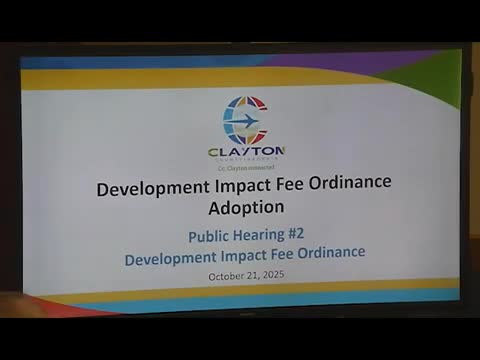Clayton County adopts development-impact fee program, sets April 1 implementation target
Get AI-powered insights, summaries, and transcripts
Subscribe
Summary
The Clayton County Board of Commissioners voted Oct. 21 to adopt a capital improvements element and a development impact fee ordinance after a public hearing and presentations from county staff and consultants.
The Clayton County Board of Commissioners voted Oct. 21 to adopt a capital improvements element and a development impact fee ordinance after a public hearing and presentations from county staff and consultants.
The board adopted the capital improvements element that underpins the fee program and approved the ordinance adding a new Chapter 88 to the county code that will allow the county to collect impact fees on new development. County staff and the project's consultant said the ordinance is framed to use a fee schedule calculated either per dwelling unit for residential projects or per square foot for most nonresidential projects.
Why it matters: County officials said impact fees shift part of the upfront cost of new public facilities to incoming development rather than leaving those costs entirely to existing taxpayers. A county staff presenter warned the board that adopting the capital improvements element without enacting fees would leave the county without a funding mechanism for the projects listed in the element.
“We discussed that the CIE is solely dependent upon the passage of impact fees,” a county staff member said during the presentation. “If the CIE is adopted but impact fees are not, there’s no money to pay for all the infrastructure needs that’s in that CIE.”
The consultant and staff presented the fee framework at the meeting and said the recommendation was the maximum fee schedule allowed under state law; the consultant explained fees can be set at or below the maximum and that the ordinance includes a process to consider case-by-case reductions. Staff also described the scope of services the fees would support, listing parks and recreation, libraries, public safety functions and emergency communications among potential recipients.
Board members asked when the fees would start to be collected. County staff proposed an initial effective date of April 1, 2026, and said that date could be moved earlier if county departments and the implementation systems are prepared. The board voted to adopt the capital improvements element and the ordinance; staff said they will follow up with the Georgia Department of Community Affairs and begin implementation work with the consultant.
What’s next: Staff said the county will finalize an operations manual, train staff and configure permitting systems to calculate and collect fees. The board and staff emphasized that the fee schedule and the capital improvements element will be reviewed and may be revised at the statutorily required update periods, allowing changes to add or remove categories if needed.
